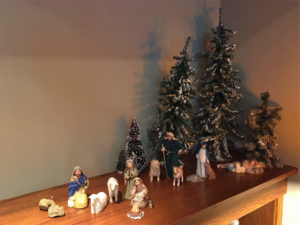Christmas and Work: Work and Our Identity
But the angel said to [the shepherds], “Do not be afraid. I bring you good news that will cause great joy for all the people. Today in the town of David a Savior has been born to you; he is the Messiah, the Lord. This will be a sign to you: You will find a baby wrapped in cloths and lying in a manger.”
Luke 2:10-12

The shepherds and company of our Nativity set. Photo used by permission from Mark D. Roberts. All rights reserved.
The shepherds in my wife’s nativity scene are colorful and well dressed. They’re the sort of people you’d be glad to have in your living room (even if they stand on the bookshelf and never talk). The shepherds in our crèche have children and pets with them, not to mention several clean, odorless, and picturesque sheep.
When we read about the shepherds in Luke 2, it would be tempting to project onto the story our own experience of Nativity scene shepherds. In reality, though, shepherding was hard, gritty work. Shepherds spent their time outside, hanging around animals that were not, in fact, odorless. They had limited access to bathing or other comforts. Shepherds were not well paid. Nor were they highly regarded. In some contexts, shepherds were actually despised and distrusted, though this may not have been true in first-century Jewish culture. In general, though, shepherds found themselves among the lower class, without benefit of honor, privilege, or ease.
Yet, God sent his angels to some shepherds to announce the birth of his Son, the Messiah. God did not send angels to the religious authorities, or to the rulers of Judea, or to the wealthy, or to those who were highly respected in society. No, God sent his angels to mere shepherds, who became the first human beings, outside of the holy family, to know about the birth of Jesus.
I’m struck by the fact that God chose to reveal such stunning good news to people who were relative “nobodies.” Their work, however necessary it may have been, did not earn money, fame, or honor. Yet this didn’t keep God from granting to the shepherds one of the greatest honors of all time. God didn’t choose his audience in terms of their strategic benefit or cultural worthiness. Rather, God chose those whom he knew would respond to the good news of the Savior’s birth. And he chose those who would continually remind us of his values.
For many of us, our identity is tied up in our work. If we’re successful, then we think highly of ourselves. If we’re not, then we can regard ourselves as failures. What we do for work can define who we are. This is not altogether wrong, since we were created for work and work is central to our life’s purpose. But we can easily define ourselves so exclusively in terms of our work that we lose sight of how God values people. Remember Paul’s words to the Corinthians: “Brothers and sisters, think of what you were when you were called. Not many of you were wise by human standards; not many were influential; not many were of noble birth. But God chose the foolish things of the world to shame the wise; God chose the weak things of the world to shame the strong. God chose the lowly things of this world and the despised things — and the things that are not — to nullify the things that are, so that no one may boast before him” (1 Cor 1:26-29).
The Christmas story underscores the fact that God values those who respond to him with faith and obedience. God is looking, not for those who are great in achievement, but those who are great in openness to him.
QUESTIONS TO CONSIDER:
To what extent are you defined by your work?
What else tells you who you are? From what do you get your identity?
Are you ready to respond to God’s call? Or are you too busy with other things?
PRAYER:
Gracious God, thank you for choosing to reveal the good news of Jesus’s birth to shepherds. Thank you for reminding us that our value to you is not determined by our work, but rather by our readiness to receive and embrace your word.
Help us, we pray, to be like the shepherds in our responsiveness to you. Teach us to see ourselves as you see us, and to define ourselves in light of your love for us and your call upon our lives. Amen.
Explore more at the Theology of Work Project online Bible commentary: Friends in Low Places (1 Corinthians 1:18–31)

Mark D. Roberts
Senior Strategist
Dr. Mark D. Roberts is a Senior Strategist for Fuller’s Max De Pree Center for Leadership, where he focuses on the spiritual development and thriving of leaders. He is the principal writer of the daily devotional, Life for Leaders,...


